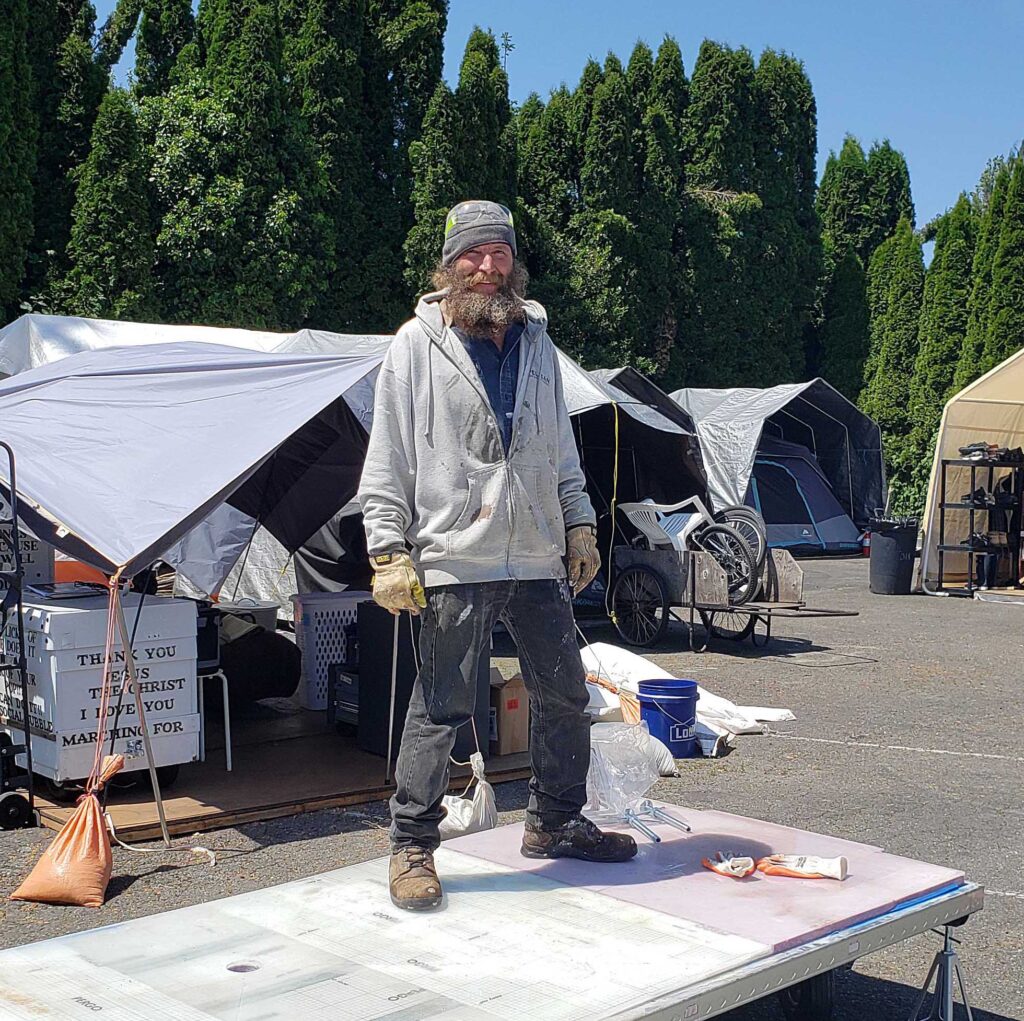For this post I can rehash statistics and talking points, but that would be boring.
Camp United We Stand is a county sanctioned homeless camp that rotates between church parking lots every three months – mostly in the Shoreline, Washington area. I have been a friend of the camp for the past 18 months, so I decided to interview a few residents to learn their stories.
The camp only currently houses 32 residents – they purposely keep the camp small to avoid the infighting that can occur with larger populations. The average age at the camp is around 55 and includes 3 students and 4 retired veterans. Many residents of the camp are experiencing homelessness for the first time.
Eight of the current residents have jobs, which range from handyman work, driving for Uber, to starting new businesses. But all residents also volunteer at the camp, working regular shifts that is like a job.
One man that I spoke to was 28 when he entered the camp as the pandemic was ending. He and his partner broke up, which left him with no place to live. He worked as an estate gardener, which is a fine job but doesn’t pay enough to live on your own in Seattle. He settled into the camp for a year and then left for 10 months to live with a roommate. That situation didn’t work out, but he says that he returned to the camp primarily because of the support and community feeling. He recently left his job to become a fulltime student (studying Computer Science with an interest in AI) while still living at the camp. As a seasoned computer programmer, I told him that I’d be happy to help him with his studies.
One resident is experiencing homelessness for the first time at age 84 years old. She had a living arrangement that fell through and was left with no place to live.
One recent resident was a victim of a head on collision two years ago that left him with expensive medical bills and serious injury which prevents him from working. He is suffering from early onset dementia as a result of the accident. He has been living under a bridge for the past 16 months, and just recently found the camp (he had his first shower in 16 months!)
One resident worked as a pipe welder on the keystone pipeline, but was not able to find work when it shut down in 2021.
One resident lived in an apartment for 22 years, but was thrown out when the owner died and the son decided to renovate.
One resident works as a fisherman, which is seasonal. Part of the year he lives in the camp, the rest of the time is spent living/working on a fishing boat.
Some residents owned businesses that failed, and these residents are trying to start new businesses.
There are also many stories of former camp residents.
Kelly was a former resident whom we knew well, but she was able to transition into transitional housing and finally into her own apartment. She is on the camp’s board of directors and continues to do volunteer work at the camp.
Justin entered the camp in 2019 strung out on crystal meth, and topped cold turkey 7 days later. He met his partner and 3 tents down, and together they were able to turn their lives around. Today they have a daughter, and apartment, and he has a job.
Mary was a nurse at the Fircrest Residential Rehabilitation Center when she was attacked by a patient and suffered serious injuries, including brain damage. She was no longer able to work and was stuck with huge medical bills, which the state refused to pay. She lived in the camp for about a year until the state rewarded her the benefits required by law (at which point she moved into an apartment).
I am saving the best for last:
Christopher Carter has the kindest eyes and roughest hands that you will ever meet. He is also a rare unicorn in the homeless population – he chose this lifestyle so he could help others.

Christopher was raised in Big Spring, Texas – a town in the middle of nowhere and near the setting of the movie The Rookie. He worked in the oil fields for 15 years and then moved into the production side of the business. He was successful and even filed some patents that were stolen by Haliburton. Christopher always had a strong spiritual bend, and one day he decided to sacrifice it all to help others. He is responsible for much of what goes well at the camp. He ensures that the camp passes the various inspections, he makes repairs after bad storms, and ensures that people are safe, warm, and dry. He also picks up money by doing odd jobs.
He has such a good attitude that people are eager to help him (myself included). One man bought him a phone and keeps him on their family plan. Somebody else gave him a functioning RV that he keeps at the camp. He is quick to spend his own money on others.
He says that the hardest part of being homeless is meeting people who are broken and in very hard circumstances. He says that sleeping on concrete breaks a person and messes up their body in serious ways. He does what he can to help everybody, but it never feels like enough.
Christopher has never asked me for anything for himself. I’ll ask him at nighttime what he has eaten that day and he’ll admit that he had a sandwich in the morning. He’ll gladly accept my dinner offer, but he would never bring it up himself.

